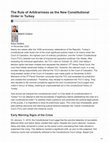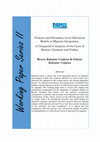Papers by Gülçin Balamir Coşkun

European Review, 2016
This article argues that the effects of high-level corruption scandals on the future of a dominan... more This article argues that the effects of high-level corruption scandals on the future of a dominant party depend on the existence of a rule of law system based on the separation of powers. The article will study two examples from a comparative perspective to concretise its theoretical claims: the Christian Democracy Party in Italy, which was the dominant party from 1948 to 1992, and the Justice and Development Party in Turkey. The comparison will be based on an institutionalist perspective. The first part tries to provide a theoretical clarification of the concepts of predominant party systems and corruption. The second part discusses whether the Turkish and Italian party systems can be classified as predominant and the characteristics of these systems. The final section seeks to draw out similarities and differences between these two systems and the effects corruption has on them.

European Review, Dec 19, 2016
This article argues that the effects of high-level corruption scandals on the future of a dominan... more This article argues that the effects of high-level corruption scandals on the future of a dominant party depend on the existence of a rule of law system based on the separation of powers. The article will study two examples from a comparative perspective to concretise its theoretical claims: the Christian Democracy Party in Italy, which was the dominant party from 1948 to 1992, and the Justice and Development Party in Turkey. The comparison will be based on an institutionalist perspective. The first part tries to provide a theoretical clarification of the concepts of predominant party systems and corruption. The second part discusses whether the Turkish and Italian party systems can be classified as predominant and the characteristics of these systems. The final section seeks to draw out similarities and differences between these two systems and the effects corruption has on them.

Movements Journal for Critical Migration and Border Regime Studies, 2018
More than two and a half million Syrian people in Turkey live in urban areas of metropolitan citi... more More than two and a half million Syrian people in Turkey live in urban areas of metropolitan cities, particularly in Istanbul. The basic needs of the Syrian population are provided by central agencies authorized by national regulations. However as the number of the refugees increase in urban areas and as they spend more time in their neighborhoods, refugee movements have inevitably gained an urban character. Thus, municipalities in Turkey are more pushed to engage in the provision of services they have no legal responsibility to provide. How should municipalities respond to these challenges? This study focuses on the case of local governments within Istanbul, and their responses to the movements of Syrian refugees. For this purpose, our research team conducted semi-structured, in-depth interviews with representatives from five district municipalities in Istanbul. This was then followed up by a data analysis employing a comparative approach to grasp the peculiarities of municipal-lev...

Verfassungsblog, 2023
Nearly two weeks after the 100th-anniversary celebrations of the Republic, Turkey's constitutiona... more Nearly two weeks after the 100th-anniversary celebrations of the Republic, Turkey's constitutional order faced one of the most significant judicial crises in its history when the Court of Cassation, the highest court of ordinary jurisdiction, and the Turkish Constitutional Court (TCC) clashed over the fate of imprisoned opposition politician Can Atalay. After reviewing his individual application, the TCC ruled on October 25, 2023, that Atalay's election rights had been violated and requested the Istanbul 13 Heavy Penal Court, the court that initially sentenced Atalay, to release him. However, the relevant court, in a way, avoided taking responsibility and referred the TCC's decision to the Court of Cassation. The long-awaited verdict of the Court of Cassation was made public on November 8,2023. Members of the 3 Penal Chamber concluded that the TCC had exceeded its jurisdiction and violated the constitution. Therefore, they refused to implement the TCC's ruling. They also decided to file criminal complaints against the nine Constitutional Court judges who voted in favour of Atalay, marking an unprecedented act in the constitutional history of Turkey. How should we interpret this constitutional crisis? Is it the death of constitutionalism in Turkey? Is it an attempt to test the boundaries of legitimacy before establishing the rules of a new constitutional order? To address these questions and assemble the political-legal pieces of the puzzle, it is imperative to trace its preliminary signs. This crisis was foreseeable, given past political discourse and alarming judicial tensions between the Turkish Constitutional Court (TCC) and certain first instance courts.

Publizistik, 2020
This article focuses on the forced transformation of the mass media as an institution in new auth... more This article focuses on the forced transformation of the mass media as an institution in new authoritarian states. It aims to understand the methods used by theses states to control and manipulate the flux of news through the mass media. Turkey's media system has been chosen as a case study because the recent political developments in the country offer worrisome und devastating examples. This article aims to answer to the following question: How can we classify methods and strategies used by the AKP government to capture the media in Turkey? Why and how do the methods used by the AKP government differ from those applied by previous governments? To answer to these questions, the article draws on media capture as a framework of analysis. It argues that the AKP captured the media by using new strategies which can be divided into three overlapping and interconnected categories: capture by creating its own private media, capture through financial sanctions, and capture by intimidating and criminalizing journalists.

Movements. Journal for Critical Migration and Border Regime Studies, 2018
More than two and a half million Syrian people in Turkey live in urban areas of metropolitan citi... more More than two and a half million Syrian people in Turkey live in urban areas of metropolitan cities, particularly in Istanbul. The basic needs of the Syrian population are provided by central agencies authorized by national regulations. However as the number of the refugees increase in urban areas and as they spend more time in their neighborhoods, refugee movements have inevitably gained an urban character. Thus, municipalities in Turkey are more pushed to engage in the provision of services they have no legal responsibility to provide. How should municipalities respond to these challenges? This study focuses on the case of local governments within Istanbul, and their responses to the movements of Syrian refugees. For this purpose, our research team conducted semi-structured, in-depth interviews with representatives from five district municipalities in Istanbul. This was then followed up by a data analysis employing a comparative approach to grasp the peculiarities of municipal-level responses to the movements of refugee. It suggests that local governments in Turkey develop varied responses. However, all local governments have been pushed to find alternative ways to bypass or interpret the rules and regulations; in some cases, they also develop discourses opposing the central government.

Education plays a crucial role in the integration process of migrants and refugees in their new c... more Education plays a crucial role in the integration process of migrants and refugees in their new countries. However, in most of the cases, education has appeared as the weakest policy area among integration policies. As education institutions and organizations can benefit from guidance and good practices on how to tailor the provision of education for migrants, this working paper aims to review and compare the institutional arrangements for the integration of migrant children in Britain, Germany and Turkey. For the analysis, institutional arrangements of primary and secondary level education are taken into consideration. In this context, answers to the following questions will be sought: what is the institutional structure? how much budget are shared for migrants' education? Are there special courses for migrant students within national curricula? If yes, how these courses are placed in the curricula? Are they compulsory? It is argued that the comparisons from the selected cases will provide insights for policy recommendations to o tailor the provision of education for migrants.
SUMMARY: 1. The institutional significance of the June parliamentary elections and the characteri... more SUMMARY: 1. The institutional significance of the June parliamentary elections and the characteristics of the electoral system. – 2. The evaluation of the International Observation Mission. – 3. Parliamentary elections in a highly tense political environment. – 4.The electoral results. – 5. The future of the constitutional engineering process.
Books by Gülçin Balamir Coşkun











Uploads
Papers by Gülçin Balamir Coşkun
Books by Gülçin Balamir Coşkun